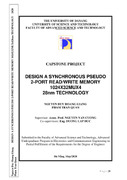
Vui lòng dùng định danh này để trích dẫn hoặc liên kết đến tài liệu này:
http://thuvienso.dut.udn.vn/handle/DUT/4116| Nhan đề: | Design a synchronous pseudo 2-port read/write memory 1024x32mux4 28nm technology | Tác giả: | Nguyen, Duy Hoang Giang Pham, Tran Quan |
Người hướng dẫn: | Nguyen, Van Cuong, Assoc. Prof. | Từ khoá: | Pseudo;Synchronous | Năm xuất bản: | 2020 | Nhà xuất bản: | Trường Đại học Bách khoa - Đại học Đà Nẵng | Tóm tắt: | Static random-access memory (SRAM) is a critical embedded part of most modern VLSI system-on-chip (SoC). It is a type of semiconductor memory that uses bistable latching circuitry (flip-flop) to store each bit. Static random access memory (SRAM) is the solution often chosen by its fast speed, stability and low power consumption. Data stored on SRAM is only a temporary; it means that data will disappear when the power is turned off. In our thesis - Design synchronous pseudo 2-port Read-Write memory 1024x32 mux4 - our team has built a high performance and low power consumption Pseudo-2-Port SRAM using the technology 28nm process. To meet the criteria of small area, high performance and low power consumption, the 6T bit cell and some design techniques (folding SRAM, pre-decoder and so on) are used. To accomplish this project, our team need to understand the structure SRAM memory both top-view and leaf-cell level. Meanwhile we investigate its operation by draft the true table and data flow. The project Pseudo 2-port (P2P) SRAM memory circuit is implemented in a 28nm process. This circuit operates over the temperature range from –40℃ to 125℃ with supply voltage 0.9V ± 10% and with corners SS, TT, FF. |
Mô tả: | DA.FA.20.017 ; 91 p. |
Định danh: | http://thuvienso.dut.udn.vn/handle/DUT/4116 |
| Bộ sưu tập: | Khoa Khoa học Công nghệ tiên tiến - Điện tử Viễn thông |
Các tập tin trong tài liệu này:
| Tập tin | Mô tả | Kích thước | Định dạng | Đã có tài khoản, vui lòng Đăng nhập |
|---|---|---|---|---|
| 7.DA.FA.20.017.NguyenDuyHoangGiang.pdf | Thuyết minh | 18.37 MB | Adobe PDF |  |
Các đề xuất từ CORE
Lượt xem 20
55
đã cập nhật vào 17-12-2025
Lượt tải xuống 50
3
đã cập nhật vào 17-12-2025
Google Scholar TM
Kiểm tra...
Khi sử dụng các tài liệu trong Hệ thống quản lý thông tin nghiên cứu phải tuân thủ Luật bản quyền.